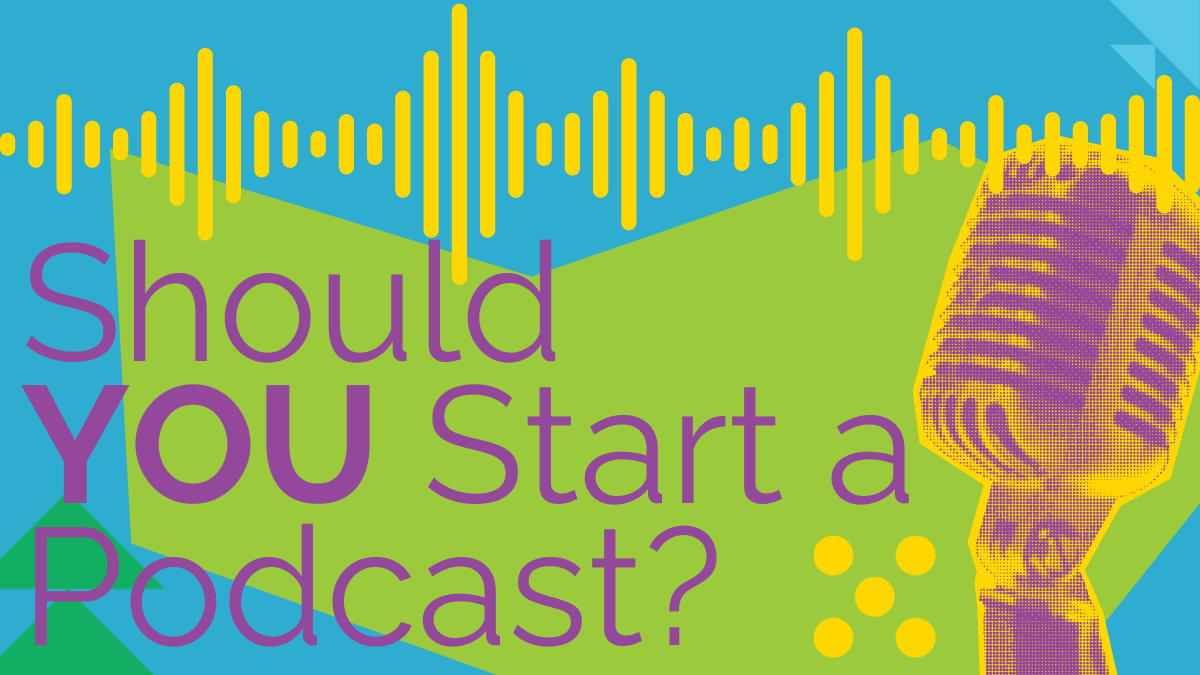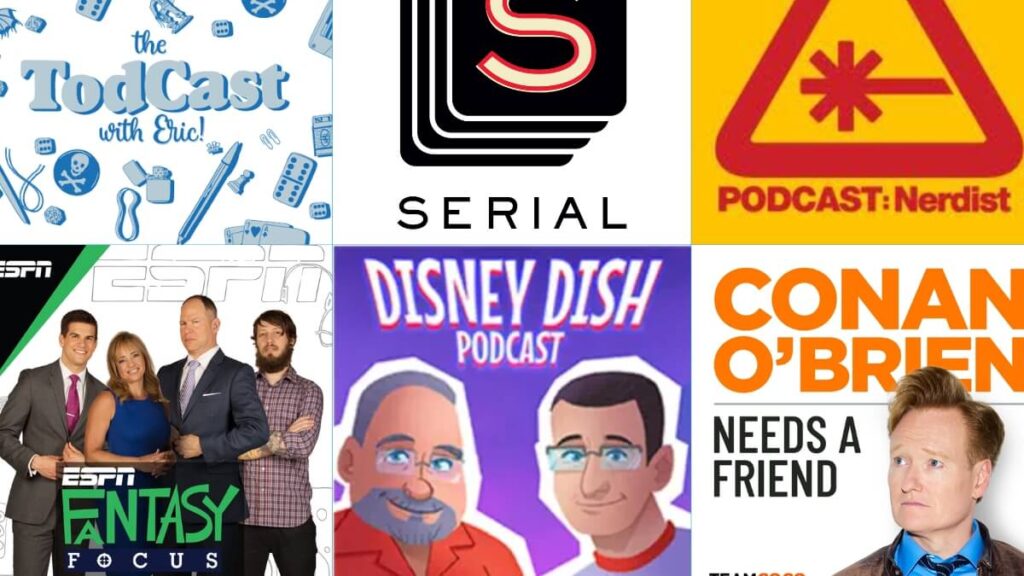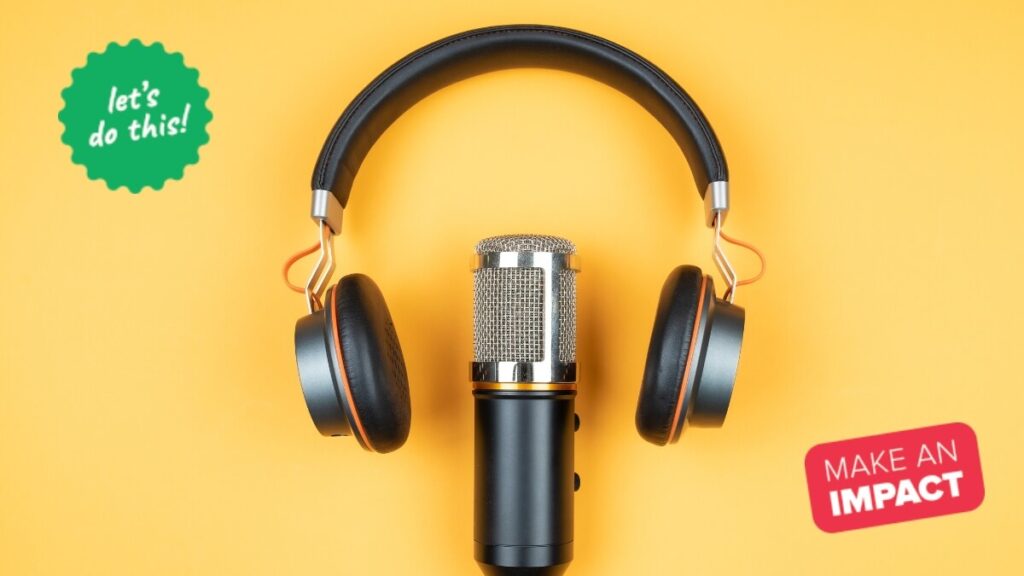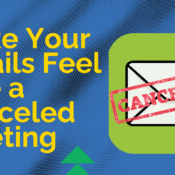
Should You Start a Podcast?
Every single year podcast listenership has gone up. Two out of every three Americans over the age of 12 have listened to a podcast this year. That's a crazy rise considering ten years ago it was just 33%.
And we are not just talking about a one-off podcast. Nearly half of Americans listen to a podcast each month. One out of three listens to a podcast weekly.
With this rise of podcast consumption, you would think it's a great idea to start a podcast for your business, brand, or as a hobby - right?
But you might want to think again.
Podcasts - the Start of the Evolution
Podcasting has been around for nearly twenty years. That's a bit wild to think about, but maybe that's just because I have three children that never existed in this life without this medium. That said, even though podcasting started in the early 2000s, it wasn't widely adopted until ten years later.
iPods and iPhones, along with the Apple Podcasts App, made it easy for users to access and download popular podcasts, which led to a boom in the audio space. A lot of my favorite podcasts and early adopters started in the 2010s.
- "The Disney Dish with Jim Hill" started in 2014 (my favorite and the reason I'm Disney-obsessed).
- "The Nerdist" Podcast with Chris Hardwick started in 2010.
- "Serial" - possibly the most famous podcast - started in 2012.
Podcasts were great for individuals looking for niche content that was not popular enough for the mainstream. There weren't enough diehard Walt Disney World history fans out there to get a weekly special on the History Channel or XM Radio, but there were enough to support on podcasting platforms. Much like the early days of the internet, content was now available for specific niche communities and the ease of access continued to grow with the widespread popularity of smartphones.
Podcasting is for Everyone
Entry into the podcasting world was not super difficult. If you had an audio recorder and could follow some blog instructions, you could find a way to get your podcast on iTunes (now Apple Podcasts). For some, like myself, we would just upload audio files to our website - which was not the best idea, but worked). Over time, platforms like Anchor made it even easier to edit and distribute podcasts.
And because everyone could create a podcast, a lot of people did. In 2006, we had a total of ~6,000 podcasts. Ten years later we had ~200,000. Today, we have over 5 million podcasts worldwide.
Niche podcasts continued to get more niche. From a consumer standpoint, you could find your people talking about the exact thing you love. From a podcaster perspective, the space became very crowded.
Podcasting is Not for Everyone
Even though there are over 2 million podcasts listed in Apple Podcasts, only ~450,000 are active. A lot of podcast hopefuls realized that it was hard work to gain a following and produce on a consistent basis. Because of these challenges, many of the podcasts were quickly abandoned.
When searching on popular platforms or podcast apps, you will often see podcast series with a few episodes and podcasts that haven't released new content in ten years. However, the search features still show these old episodes and series - which often makes it more difficult for active podcasts to be found.

Celebrity Podcasts Taking Over
When you look at podcasting statistics, you see that more and more people are listening each year. It makes sense since the audience has grown that you should jump in and capture some of that audience. Well, herein lies some of the problem.
Podcasts are not on an equal playing field.
Over time, podcasting started to become profitable. Advertisers found that people would support podcasters, and in many cases, advocates actually preferred to buy from their favorite podcasts. With the money, celebrities and businesses started to follow.
Over the years, niche podcasts have been overrun by celebrities and those in the entertainment industry. With money, production, and notoriety, these new celebrity-driven podcasts started to take over. Granted, I love Conan O'Brien, but in 2018, when Conan wanted to join the podcast world, he immediately jumped the line and likely took an hour of listenership from a lesser-known comedian and their podcast. I know this because I had to make that choice myself.
Why would you want to listen to a few random folks from West Virginia talk about college football when you can listen to a few ex-college players discuss?
It made it really hard to stand out and get organic listeners.
Podcasts for Content Marketing
Over time, corporations and businesses found that podcasting was more of an entry-level way to sell products than a place to simply celebrate fandoms or discuss topics. If you were a digital marketing company, you launched a podcast giving tips and tricks because you knew someone would listen and you would have a chance to gain a new client. No judgment - but things started to get a little murky.
Travel agents would start vacation podcasts and it was really hard to tell if their opinions were geared towards you booking a vacation where they received better perks or incentives. Podcasters would start changing their formats so they could maximize the amount of ads - instead of making the podcast format work best for the listener.
Of course, when money gets involved, things evolve.

Should You Start a Podcast?
As you can tell, over the past 20 years, podcasting has become quite a bit more complex, but it is simpler than ever to get started.
Easier Than Ever to Create
- Recording equipment is less expensive
- Uploading and hosting are cost-effective and easy
- There are more people listening than ever
- Sponsorship money is there
Harder Than Ever to Get Noticed
- Crowded marketplace with niche podcasts
- Celebrities and professionals will get first dibs
- Takes longer to gain an audience and show a profit
- Skeptical audience will question the motivation for the show
I've been part of many podcasts. My brother and I produced over 400 episodes of our podcast, "The Todcast Podcast," and we could never really get over the hump. Neither one of us is a celebrity and we were competing for "listener time" with some of the biggest players out there. We didn't niche down enough and our hodgepodge of a show could never gain traction with the algorithms. Even after cleaning up the audio, researching topics and keyword strategies, and even promoting - it just never turned out to be profitable.
I'm not saying this will be your situation, but if you don't go in with clear goals, initiatives, and checkpoints - you will have a hard time being successful.
Starting a Podcast
I will be the first to tell you - YOU DO NOT NEED TO MAKE MONEY TO HAVE A SUCCESSFUL PODCAST. Yes, I screamed that in ALL CAPS for a reason. Success is subjective. You are allowed to have a podcast for fun and fun alone. My brother and I liked talking and recording, so we recorded for over five years. Money is not the only reason to create a podcast.
But, many people who want to put time and effort into something would like to make money.
Promote a Product before Ad Share Revenue
Don't think about getting a ton of money from sponsors from the start. You will need to get a dedicated audience and a consistent listenership. Over time that can happen. But, if you want to make money from the start - find a product that you sell or someone who will pay you for each sale that comes from your site.
Travel agents that talk about Disney are a perfect example. They may not make money from ads on the podcast, but they can gain clients who develop enough trust in their expertise to call them directly.
Niche Down and Stay There
If you are too broad, you won't get to the right people. At this point in time, there are thousands of podcasts talking about exactly what you plan on talking about.
You can't just make a football podcast and expect to gain an audience.
You can't just make a fantasy football podcast and expect to gain an audience.
You are more likely to gain an audience if you create a fantasy football podcast that talks about the best kickers each week.
Yes, the audience will be small - but you will be more likely to find your people, and they will be more likely to come back and support you. Over time, they will continue to support the show even as you broaden your topics and grow your audience. Ultimately, you can use this strategy to grow an audience to rival the bigger podcasts that talk about those same broad topics.
Oh - but you still have to make sure this is something people will search for. If you are way too niche, there isn't an audience. Do some keyword research before you start.
Audio Matters the Most
If you have bad audio, kiss your podcast goodbye. Don't even start if you can't figure this out. Seriously, people can tolerate bad video, but won't give bad audio a chance.
Your content would have to be lightyears better and something no one has ever discussed to beat out poor audio.
What is poor audio? Honestly, there are a lot of issues you can have. Have a friend listen to a sample and give you honest feedback. Most people know if something sounds good or bad.
Show Names and Titles Matter
If you get too cute with your podcast show name or the episode titles, you won't get found. Be cute in the podcast, but not with naming. Many of the platforms rely on the titles of the podcasts and episodes to retrieve results when users are searching. You need all the help you can get, so make sure you think about what someone will search for and why your podcast will show up.
Consistency
Be prepared to create a lot of shows with a very small audience. Even if you have a lot of friends on Facebook or Instagram, don't expect them all to listen and support. Remember, this is a niche podcast. You may love the "Housewives of Salt Lake City" and think that all your friends will listen to your 30-minute opinion podcast, but they won't. Maybe ten of your friends like that show and only 6 will have time to listen to your podcast.
You don't have to produce daily, weekly, or monthly - but you do want to let your audience know the cadence and stick with it.
I'm not a stickler for having the podcast released at the exact same time and day, but I do realize that people build you into their habits. If you can make it the same time and day, that gives you a better shot of not getting replaced.
Be Entertaining or Provide NEW Perspectives
I know, it's hard to tell someone to be entertaining, but do understand this is a form of entertainment. If you are not entertaining, find a co-host that is. You can always provide the value and rely on someone else to be the life of the party.
Also be aware that you are not just competing with other podcasts. You are competing with YouTube shows, music streaming services, and even a phone conversation with a friend. Getting someone to choose your podcast means you are providing unique, interesting content they can't get elsewhere.
Next Level - Success or Failure
Don't go into your podcast thinking it will be a failure. Go in understanding you need to complete several steps and have checkpoints along the way. If you have been recording for years and can't generate interest, find out if the time, effort, and enjoyment are worth it. If not, call it quits.
Growth can be one new listener a year and if that is what you are looking for, continue on.
Be sure to set up tracking mechanisms to see if you are moving forward. Find out what episodes get the most listens and try and reverse engineer why.
As long as you are setting some goals and making an effort to achieve them, you are moving on the right path.
And not all goals have to be more listeners. If you are selling products, are you increasing your sales from podcast links? Not every podcast has to generate thousands of listeners.
But if things aren't working out, know when to end it. If you are spending a few hours a week on something that is not generating results or enjoyment, that time could be spent elsewhere and could provide better productivity.
Podcasting
Podcasting is hard. There are no guarantees to success and too many people dive in thinking that they can talk so they will be successful.
Be sure to do your homework and be prepared to work hard to make your podcast a success.
If you go in with the right state of mind, I say add your podcast to the mix and let's hope to grow the audience even more in the coming years.




